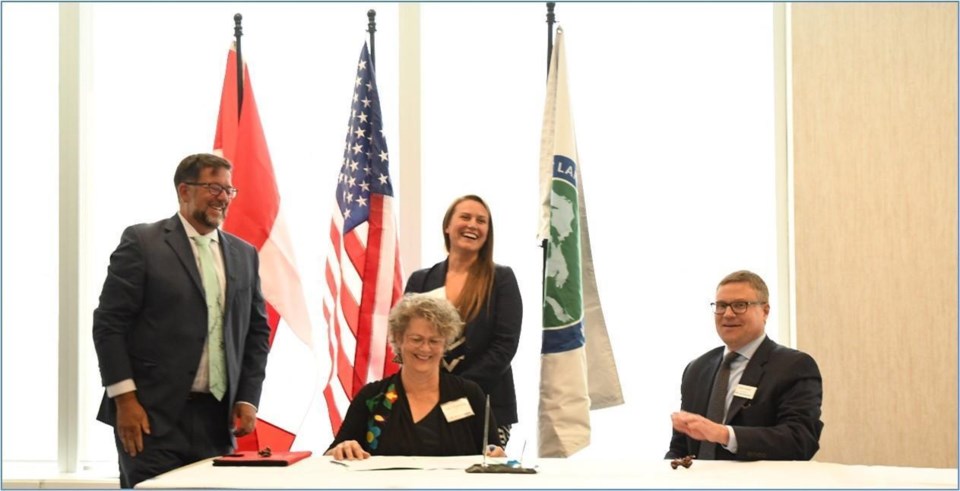The Great Lakes Fishery Commission and the Indigenous Environmental Institute at Trent University have signed a Memorandum of Understanding.
It will establish a graduate and Indigenous learner scholarship and support program—including developing elements such as fellowships, scholarships, and research support—to advance training and experiences for Indigenous learners.
In addition, the partnership will identify Indigenous research priorities and seek opportunities to support the research on both sides of the Canada-U.S. border.
Read the full news release from the Great Lakes Fishery Commission below:
A new partnership between the Great Lakes Fishery Commission and the Indigenous Environmental Institute at Trent University aims to build research-related capacity and develop collaborative programs to support Indigenous Nations and Tribes across the Great Lakes in a way that is respectful of the Treaty and inherent Rights and Interests of participating Nations and Tribes. The Memorandum of Understanding (MOU) confirms each institution’s commitment to respectful, ethical collaboration of Indigenous and Western knowledge systems in a way that will be mutually beneficial for all involved.
"Indigenous-led research is paradigm shifting,” said Dr. Barbara Moktthewenkwe Wall, partnership co-lead, associate professor, and director of the Indigenous Studies PhD program within the Chanie Wenjack School of Indigenous Studies at Trent University. “Through this collaboration, we will work to bring together Indigenous relationality and science with dominant science and create a deep and holistic understanding of Great Lakes ecosystems. Our work will honour and bring to the forefront Indigenous knowledges and ways of knowing.”
“The Great Lakes Fishery Commission is excited and proud to enter into this partnership with Trent University’s Indigenous Environmental Institute, said Ethan Baker, chair of the Commission and mayor of the City of Troy, Michigan. “As a bi-national organization charged with facilitating cross-border cooperation in fisheries research and management, the Commission recognizes the essential contributions of Tribes and First Nations who have inherent rights to the region’s lands and waters. This MOU strengthens the connection between Indigenous ways of knowing and Western science to ensure diverse perspectives, experiences, and visions for the future are openly shared among those working to protect the Great Lakes.”
Through the MOU, the Commission and Trent University will establish a graduate and Indigenous learner scholarship and support program—including developing elements such as fellowships, scholarships, and research support—to advance training and experiences for Indigenous learners. This partnership will also support a process to identify Indigenous research priorities and seek opportunities to support Indigenous-led research on both sides of the Canada-U.S. border. Further, the MOU calls for the development of a new Community Partnership Funding Program, a community-based seed-grant program, to support communities in developing research projects, which will be developed and implemented in collaboration with partners associated with the Indigenous Great Lakes Network.
“This partnership is unique in that it brings a much-needed focus to Indigenous research priorities and seeks to develop appropriate means to enhance access to programs that can address those priorities,” said Dr. Marc Gaden, the Commission’s Executive Secretary. “The MOU is a commitment from the Commission and Trent University to foster capacity building within Indigenous communities and enhance the broader Great Lakes research network. More inclusive research further supports the well-being of the Great Lakes and the fisheries they support.”
“This is an important first step towards creating equitable space for supporting Indigenous research in the Great Lakes and sets the stage for future work to be done in a good way,” said Dr. Mary-Claire Buell, partnership co-lead and assistant professor cross appointed with Trent School of the Environment and Department of Forensic Science. “This partnership will support the Indigenous Great Lakes Network, facilitating connections between Indigenous Nations and those doing important work to care for our Great Lakes. It will also create opportunities for Indigenous students pursue research that is connected to the land and waters of the Great Lakes Basin, often allowing for students to conduct research with and for their home communities.”
About Trent University
One of Canada's top universities, Trent University was founded on the ideal of interactive learning that's personal, purposeful and transformative. Consistently recognized nationally for leadership in teaching, research and student satisfaction, Trent attracts excellent students from across the country and around the world. Here, undergraduate and graduate students connect and collaborate with faculty, staff and their peers through diverse communities that span residential colleges, classrooms, disciplines, hands-on research, co-curricular and community-based activities. Across all disciplines, Trent brings critical, integrative thinking to life every day. Today, Trent's unique approach to personal development through supportive, collaborative community engagement is in more demand than ever. Students lead the way by co-creating experiences rooted in dialogue, diverse perspectives and collaboration. In a learning environment that builds life-long passion for inclusion, leadership and social change, Trent's students, alumni, faculty and staff are engaged global citizens who are catalysts in developing sustainable solutions to complex issues. Trent's Peterborough campus boasts award-winning architecture in a breathtaking natural setting on the banks of the Otonabee River, just 90 minutes from downtown Toronto, while Trent University Durham Greater Toronto Area, delivers a distinct mix of programming in the east GTA.
About the Great Lakes Fishery Commission
The Great Lakes Fishery Commission is an international organization established by the United States and Canada through the 1954 Convention on Great Lakes Fisheries. The commission has the responsibility to support fisheries research, control the invasive sea lamprey in the Great Lakes, and facilitate implementation of A Joint Strategic Plan for Management of Great Lakes Fisheries, a provincial, state, and Indigenous fisheries management agreement. To find out more, visit: https://www.glfc.org/.
